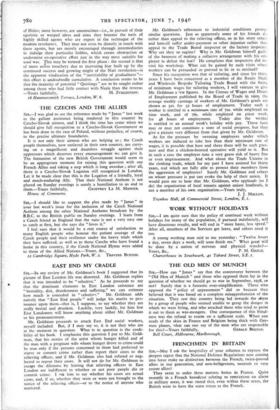EAST END MY CRADLE
Sur,—In my review of Mr. Goldman's book I suggested that its picture of East London life was distorted. Mr. Goldman replies that it was intended to be " selective." As he proceeds to say that the dominant elements in East London existence are " bestiality, dirt, drunkenness and suffering," we can estimate how much is conceded in " selective." Mr. Goldman adds naively that " East End people " will judge his merits to pro- nounce upon them—that is, I suppose, to say whether they are really bestial and drunken. Luckily, very luckily, for him few East Londoners will know anything about either Mr. Goldman or his pronouncement.
Mr. Goldman proceeds to attack East End social workers, myself included. But, if I may say so, it is not they who are at the moment in question. What is in question is the credi- bility of his book. I emphasise this question I put to Mr. Gold- man, that his stories of the artist whom hunger killed and of the man with a pregnant wife whom hunger drove to crime could be true only if the persons concerned in them had preferred to starve or commit crime rather than report their cases to the relieving officer; and if Mr. Goldman also had refused or neg- lected to report their cases. It will not do for Mr. Goldman to escape the dilemma by hinting that relieving officers in East London are indifferent to whether or not poor people die or commit crime. I ask him to say whether his cases are actual cases, and, if so, whether they were or were not brought to the notice of the relieving officer—or to the notice of anyone who mattered.
Mr. Goldman's references to industrial conditions prompt similar questions. Just as apparently some of his friends die rather than appeal to the relieving officer, so in his story other, and himself suffer under-payment or other injustice rather than appeal to the Trade Board inspector or the factory inspector. Why are they so supine? Why is Mr. Goldman himself guilty of the baseness of making a collusive arrangement with his em- ployer to defeat the law? He complains that inspectors did net visit his workshop. What can be gained by such visits where workers can be persuaded or pressed to lie or to mislead?
Since his occupation was that of tailoring, and since for thin years I have been concerned as a member of the Ready Made and Wholesale Bespoke Tailoring Trade Board with the fixing of minimum wages for tailoring workers, I will venture to give Mr. Goldman a few figures. Jn the Census of Wages and Hours of Employment published by the Board of Trade in 1909, the average weekly earnings of workers of Mr. Goldman's grade are shown as 32s. for 52 hours of employment. Today such a worker is entitled to a minimum rate of 7os. while employed on time work, and of 76s. while employed on piece work, for 48 hours of employment. Today also the worker is entitled to an annual week's holiday with pay. These facts may or may not constitute a state of social progress, but they give a picture very different from that given by Mr. Goldman.
As for the pressure by sweating employers under which workers are induced to take less than their minimum rate of wages, it is possible that here and there there will be such pres- sure and that a chicken-hearted operative will yield to it. But in such a case the employer runs a very grave risk of heavy fine or even imprisonment. And what about the Trade Unions in the clothing trade, which for my part I have assisted for thirty years, and which are fully able to protect their members from the aggression of employers? Surely Mr. Goldman and others on whom pressure is put can evoke the help of their union. It would pain me to hear that Mr. Goldman, who applauds (as I do) the organisation of local tenants against unjust landlords, is not a member of his own organisation.—Yours truly, J. J. MaLtow.
Toynbee Hall, 28 Commercial Street, London, E. r.


































 Previous page
Previous page